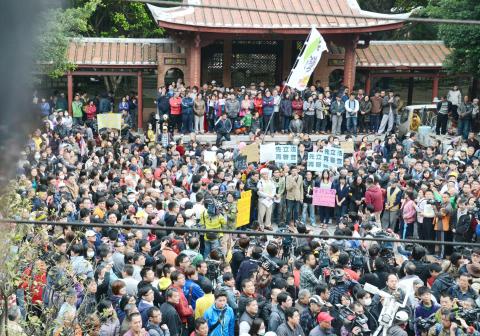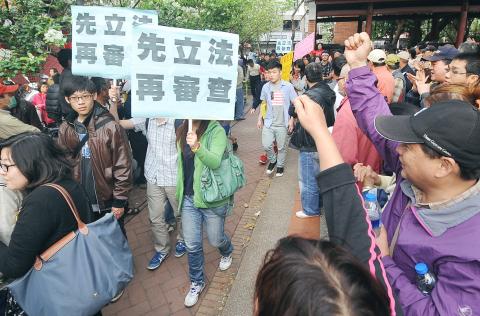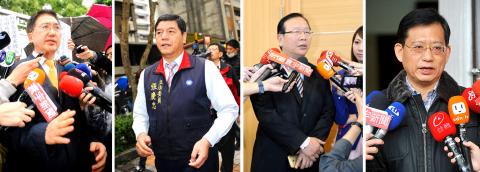Hundreds of students and other activists yesterday marched through the streets of Banciao (板橋) in New Taipei City calling for the recall of the Chinese Nationalist Party’s (KMT) “four major bandits.”
The “four bandits” refer to four KMT lawmakers who the protesters believe have been following President Ma Ying-jeou’s (馬英九) orders without hesitation — including KMT Central Policy Committee chief executive Lin Hung-chih (林鴻池), whose constituency is in Banciao.
Student leaders Lin Fei-fan (林飛帆) and Chen Wei-ting (陳為廷) announced yesterday morning that one of them would lead a group of people to Banciao to call on the electorate to exert pressure on Lin and ask him to listen to the people instead of Ma, who doubles as KMT chairman.

Photo: CNA
About 20 student representatives, including members of student group Democracy Kuroshio, nongovernmental organization workers and academics, gathered in Banciao at 2:30pm and were subsequently joined by hundreds of people.
Neither Lin Fei-fan nor Chen showed up, with the former saying from the legislative floor — which protesters have been occupying since March 18 — that they decided against going to avoid drawing media attention to them, which could have obscured the aim of the movement.
Chanting “Reject Ma’s will and respect the people’s will,” “Lin Hung-chih come out and face us” and “Recall Lin Hung-chih,” more than 500 people gathered in a park and marched through several streets before returning to the park to deliver short speeches.

Photo: Liao Chen-huei, Taipei Times
At about 5pm, police, holding up a board that read: “[Your] behavior has violated the law,” told the crowd that the gathering was in violation of the Assembly and Parade Act (集會遊行法).
Students retorted that they were just “passing by” — a reference to how Taipei police had described former gang leader Chang An-le’s (張安樂) demonstration on Tuesday.
Commenting on the protest, Lin Hung-chih said he had done nothing wrong in reviewing the cross-strait service trade agreement.

Photo: Taipei Times
He added that he was willing to apologize for the “social instability” caused by the “30-second incident and the students’ subsequent occupation” of the legislature.
He was referring to a move by KMT Legislator Chang Ching-chung (張慶忠) to pass the service trade agreement through a legislative committee meeting in 30 seconds.
Chang, the second of the so-called “four bandits,” called on everybody to calm down and to quickly put an end to the protests.
KMT Legislator Wu Yu-sheng (吳育昇), the third recall target, criticized the students, saying they represent no one and have no right to ask elected lawmakers to step down.
He compared the students’ action to police being censured by robbers and said they are behaving like “red guards.”
KMT Legislator Lin Te-fu (林德福), the last of the four, said the students had “gone overboard.”
In other developments, the student protesters yesterday proposed a “civil parliament,” saying they would implement what they described as “direct democracy” to review draft legislation to establish a mechanism to monitor cross-strait agreements in the legislature.
The meetings are to start today, with more than 1,500 people from 60 groups expected to attend, Lin Fei-fan said.
Lawmakers across party lines are welcome to join, he said, as he encouraged more KMT lawmakers to “stand with the people and respond to the students’ demands.”
Additional reporting by CNA

CHAOS: Iranians took to the streets playing celebratory music after reports of Khamenei’s death on Saturday, while mourners also gathered in Tehran yesterday Iranian Supreme Leader Ayatollah Ali Khamenei was killed in a major attack on Iran launched by Israel and the US, throwing the future of the Islamic republic into doubt and raising the risk of regional instability. Iranian state television and the state-run IRNA news agency announced the 86-year-old’s death early yesterday. US President Donald Trump said it gave Iranians their “greatest chance” to “take back” their country. The announcements came after a joint US and Israeli aerial bombardment that targeted Iranian military and governmental sites. Trump said the “heavy and pinpoint bombing” would continue through the week or as long

TRUST: The KMT said it respected the US’ timing and considerations, and hoped it would continue to honor its commitments to helping Taiwan bolster its defenses and deterrence US President Donald Trump is delaying a multibillion-dollar arms sale to Taiwan to ensure his visit to Beijing is successful, a New York Times report said. The weapons sales package has stalled in the US Department of State, the report said, citing US officials it did not identify. The White House has told agencies not to push forward ahead of Trump’s meeting with Chinese President Xi Jinping (習近平), it said. The two last month held a phone call to discuss trade and geopolitical flashpoints ahead of the summit. Xi raised the Taiwan issue and urged the US to handle arms sales to

State-run CPC Corp, Taiwan (CPC, 台灣中油) yesterday said that it had confirmed on Saturday night with its liquefied natural gas (LNG) and crude oil suppliers that shipments are proceeding as scheduled and that domestic supplies remain unaffected. The CPC yesterday announced the gasoline and diesel prices will rise by NT$0.2 and NT$0.4 per liter, respectively, starting Monday, citing Middle East tensions and blizzards in the eastern United States. CPC also iterated it has been reducing the proportion of crude oil imports from the Middle East and diversifying its supply sources in the past few years in response to geopolitical risks, expanding

An Emirates flight from Dubai arrived at Taiwan Taoyuan International Airport yesterday afternoon, the first service of the airline since the US and Israel launched strikes against Iran on Saturday. Flight EK366 took off from the United Arab Emirates (UAE) at 3:51am yesterday and landed at 4:02pm before taxiing to the airport’s D6 gate at Terminal 2 at 4:08pm, data from the airport and FlightAware, a global flight tracking site, showed. Of the 501 passengers on the flight, 275 were Taiwanese, including 96 group tour travelers, the data showed. Tourism Administration Deputy Director-General Huang He-ting (黃荷婷) greeted Taiwanese passengers at the airport and